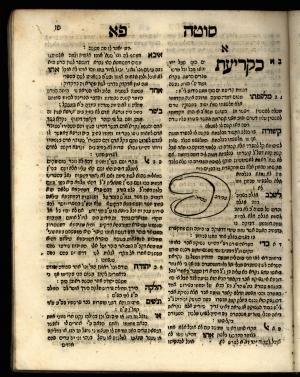Obj. ID: 37654
Jewish printed books Aderet Eliyahu by Raphael Immanuel b. Abraham Hai Ricchi, Livorno, 1742

This text was prepared by William Gross:
Explanations of difficult passages in the Talmud, responsa, homilies on various verses in the Bible, and riddles. R. Raphael Immanuel b. Abraham Hai Ricchi (1688–1743), Italian rabbi, kabbalist, and poet. Ricchi was born in Ferrara, but when he was two years old his family moved to Rovigo. When he was six his father died and his mother's brother, Jedidiah Rabbino, undertook to provide for the family and the education of the children. On Rabbino's death his son took charge of the family and married Ricchi's sister. At the age of 20 Ricchi began to travel around various Italian cities, making his living as a teacher. Although his great wish was to study Kabbalah with R. Benjamin b. Eliezer ha-Kohen Vitale of Reggio, he had to abandon his aim for economic reasons. In 1717 he was ordained rabbi in Trieste by R. Hillel Ashkenazi of Canea. Emigrating to Erez Israel in 1718, he settled in Safed, where he devoted himself to the study of Lurianic Kabbalah. In Safed he was ordained rabbi by R. Hayyim Abulafia, the rabbi of Safed. Because of a plague that ravaged the country, in which his daughter died, Ricchi left Erez Israel after two years. On his way back to Italy, his ship was captured and taken to Tripoli, but he was released after 40 days. He settled in Leghorn, but later journeyed to Smyrna, Salonika, Constantinople, and London. He spent two years in Aleppo and in 1737 he arrived in Jerusalem, where he stayed for three years. In 1741 he returned to Leghorn to settle business matters connected with his books. While on one of his trips he was murdered by robbers.
Only edition. 129; 57, [1] ff., quarto





















